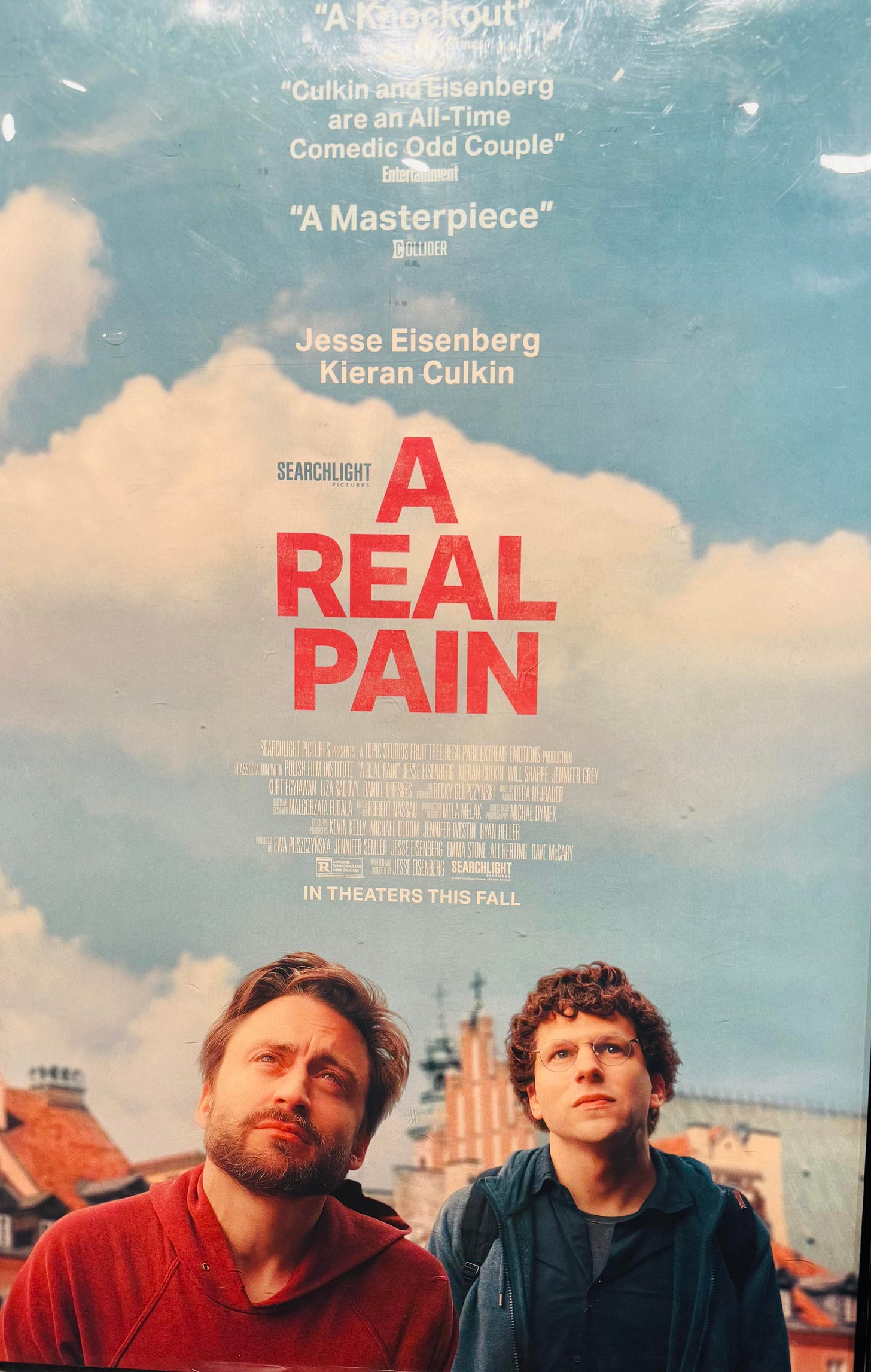Jesse Eisenberg’s ‘A Real Pain’ helped me find community
The film weaves a thread that highlights the impact of the Holocaust on Jews across the diaspora generations later.
Jesse Eisenberg’s brilliant film “A Real Pain” is getting rave reviews. While some see it as a story about discomfort, quirky families, or grief, albeit with a heavy dose of laugh-out-loud humor, I found myself thinking about the impact of the Holocaust on Jews across the diaspora, whether or not they are direct descendants of survivors.
This is something I think about a lot. As a child of the 1970s, I now look back at that era and realize that my peers and I grew up in the shadow of genocide, and the fact that this mass slaughter of the Jewish people had happened at all felt at once both horrifically shocking and, well, ordinary. Ordinary the way someone might feel living near a superfund site, shuttered for its toxic plumes. You know it’s there. You know it’s harmful. You can’t imagine how someone, or a team, or a nation, or several nations, could have knowingly allowed the dumping of radioactive contaminations into the heart of a people, and yet there it is. Ever-present.
With grandparents who fled the pogroms of Eastern Europe in the early 1900s, I can’t recall when I first learned about the Holocaust. Was it from family? Or was it at the yeshiva I attended up until fourth grade? Either way, it was presented to us children as just fact. As something that happened not that long ago to our people and now we are moving on. As a little girl, sometimes I saw people, numbers tattooed on their forearms, and paused, but now we are moving on. We read stories of Anne Frank, and as we were moving on, we wondered if we had people who would hide us, if there was a place we could go, Israel is that place, if we would have enough wherewithal to flee in time. These were ever-present thoughts as I wondered too about an upcoming math exam, what friends to have a playdate with, and whether to go play pinball at the candy store. There we were, moving on.
It felt normal until I realized other people didn’t think about where to flee, and looked at me in shock when I spoke of it. I looked back at them, equally in shock, realizing this was not their normal. And yet, it seemed that if I extended my arm, I could reach across the decades and touch the very people fleeing, or the ones discovering in horror that it was too late to do so. Through the lens of history, this experience didn’t seem that far away.
When I discovered that some of my own family did not get out of Eastern Europe in time (is there a term for us? Descendants of those slaughtered?), I worked hard to learn some of the names of my murdered relatives. Tatiana, Sarah, Jacob, Yakov, Mendel, Elka, Pincas, Ytta, Chikele, Abram, Moshe, Isy, Moni, Reuven. In their spirit, I wondered how many of us in the Jewish diaspora are walking around, unaware that we share this similar history.
“Why are you pursuing this so aggressively?” one family member asked me. “That was so long ago,” another one said.
Who knows why they had seemingly dusted themselves off, or why I kept my focus. Intergenerational trauma seems to impact each of us differently, or for some of us, maybe not at all.
Jesse Eisenberg touches on all of this. Wherever you fall on this spectrum, this film has something for you. It helped me see that I’m not so alone.
Adina Genn is a writer and published author, whose novel in progress is nearly completed. She recently graduated from Gratz College with a Master’s Degree in Jewish Studies, and is now a graduate student in the iFellows master’s concentration in Israel education. On Substack, she focuses on Jewish expression.




I had the same experience, Adina. Everyone in my brother-in-law's family with numbers on their arms seemed almost matter of fact, as if they had moved on, and I was a wide-eyed five-year-old kid looking at numbers engraved into forearms and wishing I could ask them what it meant and what their experience was like. But their family was moving on. My father, who fled the Soviet Union, from what is now Ukraine, didn't talk much about his pain, but would always warn that one day the pendulum could swing back that way. I was a kid in America, land of the free, and I wasn't sure what he was prophesizing. I understand now. Thank you Adina for the endorsement of the film in the way you experienced it.
What a wonderful piece. We should never forget. When I read this, I actually said your ancestors names out loud!